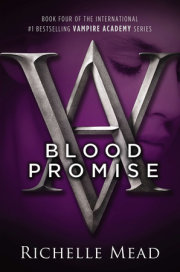CHAPTER 1SHE USUALLY WEARS BLACK
Mae dealt out death regularly. It really wasn’t a problem.
Death was clean on the battlefield, and there was no reason to dwell on what it meant. The kills were just mission objectives, and the people weren’t really people at all. It was you or them. And when the fight was done, you could just walk away.
But today? There was no walking away. Today, she was walking toward death, and that scared the hell out of her. Not much else did these days.
With a deep breath, she leaned her cheek against the living room mirror, closing her eyes and taking comfort in the way the glass cooled her skin. She repeated the soldier’s creed over and over in her head, using the familiar words to steady herself: I am a soldier of the Republic. I do not serve my own will but that of my country. I am its tool and will gladly lay down my life to further this nation’s glory. I am a soldier of the Republic. I do not serve my own will but that of my country….
A knock at the door startled her out of her mantra, and she straightened up. Another deep breath calmed the shaking of her hands, and she pushed her emotions into a far compartment in her mind. Locked away, those feelings could not touch her. They were powerless, and she was free. She double-checked her face in the mirror, but it gave nothing away. It was blank. Empty. In control.
Dag and Val were at the door, as she’d known they’d be. They greeted her with forced smiles that were a far cry from their usual happy-go-lucky selves. Both wore uniforms identical to hers: a mandarin-collared black jacket over black pants with black boots. Black everywhere. Even the buttons were black. The only color came from a scarlet pip on the collar, standing out like a drop of blood. To the inexperienced eye, these uniforms looked no different from the ones the prætorians usually wore into battle. To Mae, who could see and feel the dressy fabric of their formal attire, the uniform seemed flimsy and brought back her earlier fears of vulnerability. Being weaponless wasn’t helping matters.
“Here to babysit me?” she asked.
“Who said anything about babysitters?” Dag was always quick with a smile, though his eyes betrayed him that morning. “We’re just a bunch of friends going out together.”
“You make it sound like we’re going to a bar,” Mae said. She walked back to the mirror and examined the braided bun she’d so painstakingly worked on. Grimacing, she pulled out the hairpins and began unraveling it all.
Val made herself comfortable on the arm of the couch, lazy and limber as a cat, even under these circumstances. “What are you doing?”
“It’s messy,” Mae said.
“There wasn’t a hair out of place,” protested Val.
Mae didn’t answer. In the mirror, she saw her friends exchange troubled glances behind her. It’s worse than I thought,Val seemed to be saying. Dag’s expression said he was in agreement but didn’t entirely know how to handle it. Snapping a neck, lifting weights, donut-eating contests. Those were in his comfort zone. Therapy? Less so.
It wasn’t part of Val’s skill set either. Neither knew quite what to do with Mae, and she certainly wasn’t going to help them out—because she didn’t want them to do anything. She wanted them to treat her in their usual flippant way. And what she wanted most was for this day to be over, so that life could return to normal.
“How many times have you braided it today?” Val’s voice was uncharacteristically gentle.
“It’s not right,” Mae said, dodging the question. This was actually the eighth time she’d braided her hair. She kept pulling so tightly that her scalp had started to turn red, though the tiny metal implant in her arm dutifully dulled the pain. “You wouldn’t understand.”
Neither Val nor Dag ever had hair problems. Dag always kept his dark hair closely shaved, and Val wore hers in a pixie cut that suited her diminutive frame. I should cut mine, Mae thought. She’d considered it a hundred times but could never bring herself to do it.
“It’s okay, you know. Grief is a normal part of the, um, process.” Dag had apparently been reading self-help books before coming over. “You can even cry.”
“Why would I do that?” Mae pulled so hard on a strand of hair that she winced.
“Because that’s what people do when they lose someone they care about,” said Val. “You’re so tightly wound up that you’ll explode if you don’t relax. And do not undo that. It’s fine.”
Mae had just finished her hair again, neatly wrapping the braid into a perfect knot above the back of her neck. She really was on the verge of pulling it out again when Val grabbed her arm. “Enough, Mae. We’re going to be late.”
It was another bad sign, Val’s using her real name instead of her pet name, Finn. But Mae couldn’t deny her friend’s point. It was time to go. With one last glance in the mirror, she let them lead her outside to the subway entrance across the street. They took the blue line out to the base, earning a number of startled looks from other passengers. Prætorians weren’t that common outside of military and federal centers. A group of them was especially unusual. The passengers kept their distance and glanced around the train uneasily, wondering if they should expect a terrorist attack.
The threesome ended up reaching the base early, but plenty of other prætorians were already entering the ceremonial hall. And here, Mae faltered, stopping just outside the entrance. The spring sunshine was far too bright and cheery for a day like today. Dag touched her arm. “You okay?”
“You don’t have to go,” Val told her.
Mae saluted the flag overhead and continued forward to the hand scanner. “Everything’s fine.”
Neat rows of chairs filled the hall, which was nearly packed with prætorians. The news had come in less than a week ago, and it would have taken a fair amount of scrambling to pull so many of the guard back in from their scattered assignments. Some wouldn’t be here, of course. It was the nature of the job. But the death of a prætorian was so monumental that their superiors would’ve certainly done whatever they could to ensure a good showing.
Although there was no official seating chart, the prætorians were gathering in cohorts. Val waved at someone across the room. The Scarlets had already taken a middle position and were beckoning them over. Val and Dag started to head in that direction, but Mae stopped again, allowing her eyes to focus on the front of the hall.
There’d been no body to recover, but they’d still set out a casket made of a dark, gleaming wood. Prætorian black. A swath of indigo silk covered it, with the RUNA’s flag draped over that. Piles of gardenias sat on either side, their softness contrasting with the clean lines of the casket.
Not caring if Val and Dag followed her or not, Mae turned toward the center aisle that led straight to the shrine. A bubble of emotion—sorrow and panic combined—began to rise within her, and she staunchly pushed it down. Throwing back her shoulders, holding her chin high, she began the impossibly long walk toward the front of the room. People stepped aside for her, and those who hadn’t noticed her before now stopped to stare. She ignored those looks, along with the whispers that soon followed. She kept her gaze fixed firmly ahead, silently repeating the creed: I am a soldier of the Republic. I do not serve my own will but that of my country. Those words were echoed by her mother’s, spoken so many years ago: You can ignore the rest because you’re better than them. Empty yourself of all feeling, because if they can’t see it, then they can’t use it against you.
Copyright © 2014 by Richelle Mead. All rights reserved. No part of this excerpt may be reproduced or reprinted without permission in writing from the publisher.




























